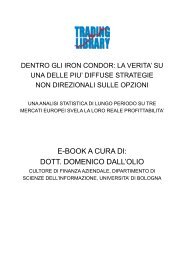o_18t8444k2t2f3fhftv922768a.pdf
Create successful ePaper yourself
Turn your PDF publications into a flip-book with our unique Google optimized e-Paper software.
16 Profiting with Iron Condor Options<br />
Buying Versus Selling<br />
Which is better, to be a buyer or a seller? There are<br />
many factors that affect that decision, so there really is<br />
no “better.” Both offer advantages and disadvantages.<br />
The Buyer<br />
The buyer has the advantage of potentially unlimited<br />
gains. He leverages his money through the purchase of<br />
options and can make returns several times his initial<br />
cost. He does, however, have a few things working<br />
against him.<br />
Those who buy stocks have to get only one thing<br />
right: direction. If the stock goes up and they sell, they<br />
make money. Simple and uncomplicated. The buyer of<br />
options has to do the same thing, pick the right direction,<br />
but that’s not all. He also has to be concerned with<br />
two additional factors: time and expiration.<br />
Actually, picking the right direction is extremely difficult.<br />
An analyst who does nothing but study a certain<br />
company for years, talks to the CEO, knows the business<br />
inside and out, and even works at the company can<br />
still pick the wrong direction for the company’s stock<br />
price. You, the ordinary investor, have access to no<br />
information that gives you an edge in the marketplace.<br />
Regardless, picking the correct direction is crucial for<br />
the stock buyer and also for the options buyer.<br />
The options buyer can’t just pick the right direction;<br />
he also has to pick the right distance the price will<br />
move. If he buys an option believing that Apple’s stock



